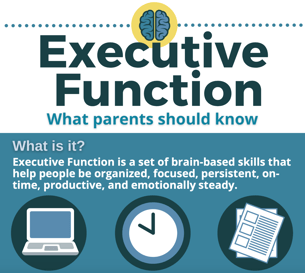New sneakers, fresh binders, and the latest model backpack. Typical must-haves for the first day of school, right? As exciting as it is for the return of “The Most Wonderful Time of the Year” and all the external trappings that entails, the real key to a great school year lies in the attitudes and habits your student cultivates. In other words, while new Nikes are nice, new skills are better - way better.
must-haves for the first day of school, right? As exciting as it is for the return of “The Most Wonderful Time of the Year” and all the external trappings that entails, the real key to a great school year lies in the attitudes and habits your student cultivates. In other words, while new Nikes are nice, new skills are better - way better.
I’m going to tell you about something called Executive Functioning (or EF, for short) and the skills that accompany it. Don’t feel bad if you’ve never heard of this before. While this concept is just starting to gain wider understanding among parents, we meet with educators and mental health professionals for whom this is a relatively new area to them, as well. I’ll take you through everything you need to know as you begin to discover how critical EF skills are and how caregivers can encourage the growth of these abilities in children. Here's what I'll be covering:
What Are Executive Function Skills?
What Executive Function Skills do Students Need?
What is the Timeline for Typical Development of Executive Function Skills by Age?
What are Symptoms of Executive Function Difficulties?
What Can Help When Students Have EF Struggles?
What are Some Strategies Caregivers Can Use to Help Children Improve EF Skills?
First things first - let’s start with a definition.
What Are Executive Function Skills?
Executive Function is a set of brain-based skills that help people be organized, focused, persistent, on time, productive, and emotionally steady. In the most basic sense, you can think of Executive Function skills as the self-management skills that help humans of all ages get things done and achieve their goals. Executive Function skills develop over time, from birth until a person is often in their mid-twenties.
As the demands of school increase each year, having well-developed Executive Function skills becomes critical in order to feel confident as a student and perform well in school; nevertheless, difficulties with EF are very common. Students who have been diagnosed with ADHD or other learning differences often have Executive Function challenges. However, students don’t always require a formal diagnosis when they struggle in this area. Sometimes, a student’s demands are simply too great for their current level of EF skills. This mismatch of demands and capacities can be commonplace, especially during transitions to middle school, high school, and college, when there is a significant increase in expectations for students.
By the time they reach high school, students are typically expected to have well-developed Executive Function skills, but unfortunately, these critical life skills are not typically taught in school. With expert guidance and structure, students can learn to effectively manage themselves so that they are equipped for taking on challenges in school or in life. School is hard work for most kids and consistent academic performance requires stamina which is built on a foundation of solid Executive Function skills.
What Executive Function Skills do Students Need?
- Managing emotions and impulses
- Managing and awareness of time
- Organizing thoughts and materials
- Paying attention, maintaining focus
- Planning and prioritizing
- Getting started (task initiation)
- Staying on track and persisting with tasks
- Remembering what to do and when to do it
- Problem-solving and flexible thinking
- Self-reflection and self-awareness
Why Are EF Skills Important?
"When children have opportunities to develop executive function and self-regulation skills, individuals and society experience lifelong benefits. These skills are crucial for learning and development."
Center on the Developing Child, Harvard University
Not only do EF skills help students with their academics, but those same abilities also help young adults navigate independent living, maintain healthy relationships, and manage their finances and career paths. Executive Functioning is the very backbone of living a happy, healthy, and productive life. You can’t get more important than that!
What is the Timeline for Typical Development of Executive Function Skills by Age?
Here’s a brief overview of some of the EF skills that are expected to be mastered as children develop.
Elementary School (Ages 5 - 10)
Children in elementary school are developing emerging skills that are foundational building blocks for future development. Examples of these include:
- learning to pay attention
- learning to control their impulses and behavior
- following simple directions and rules
Middle School (Ages 11 - 13)
Children who successfully develop impulse control, the ability to follow directions, and maintain their attention go on to develop more cognitively intensive Executive Function skills in middle school. The next level of development includes milestones such as:
- learning to think and plan ahead by imagining a future point in time
- planning out work
- problem solving when things don’t go as anticipated
- following daily household and classroom routines
High School (Ages 14 - 18)
In high school, students are beginning to develop Executive Functioning skills that will support them in their adult years. More advanced skills at this stage look like this:
- learning to think flexibly and solve problems in new ways
- adapting to shifting expectations and rules, depending on the context
- Using social skills and perspective-taking to collaborate with peers in sports, class projects, and other activities
- Reflecting and self-assessing in order to learn from mistakes and get back on track
What are Symptoms of Executive Function Difficulties?
Here are some common signs that can indicate challenges with EF skills, or Executive Dysfunction, as this difficulty is also known as:
- Trouble getting started on tasks
- Losing belongings and/or misplacing materials
- Forgetting to hand in completed homework
- Procrastinating until the last minute on important tasks
- Difficulty remembering daily routines or tasks with several steps
- Distractibility and difficulty focusing on work
- Making the same mistakes repeatedly
- Difficulty following through on tasks
- Frequently feeling upset or overwhelmed about schoolwork
If you’re reading this, it’s likely that you’ve seen symptoms like these in your child. It’s also likely that you’ve felt frustrated by the constant reminders you find yourself providing, or the conflicts over getting homework started, or the panic of losing something important over and over again - or all three! The good news is that EF skills are coachable skills and students can learn to overcome their challenges with guidance and patience.
What Causes EF Difficulties?
ADHD, learning disabilities, brain injury, mental health challenges, developmental delays, and normal differences in a child's development can all impact Executive Functioning. If you think your child may have signs of Executive Dysfunction, ask your pediatrician, counselor, or education professional for resources to evaluate your child and find the right support.
What Can Help When Students Have EF Struggles?
With guidance, students can learn tools and strategies to develop their skills like time management, organization, planning and prioritizing, persistence, and emotional steadiness.
Caregivers can learn how to support their children in developing EF skills and there are many excellent books that can serve as guides if that’s the path you’d prefer to take. Two useful books to start with are the Smart But Scattered series by Peg Dawson and Richard Guare and Your Kid’s Gonna Be Okay by Michael Delman.
If you’d rather find outside support, look for qualified professionals such as Executive Function coaches or Speech-Language Pathologists who know how to connect with students and help them gradually learn new work habits and gain independence. And don’t expect an instant fix once you provide support. Building habits that will stick with a student for years to come takes time, patience, and persistence - just like learning any new skill!
What are Some Strategies Caregivers Can Use to Help Children Improve EF Skills?
Executive Function coaches have hundreds of tools they can use to help their students. Here’s just a sampling of three easy strategies you can try at home.
If keeping organized is a struggle for your child, co-create systems with them to keep belongings organized and be consistent with expectations about your child using them. Maybe you have hooks by the door to stow backpacks and jackets, maybe you have a pre-bedtime backpack and homework check to assure everything is in its place for the morning, or maybe you have a Sunday morning bedroom tidying session. Whatever you choose to try, keep in mind that habits take many weeks to develop and months before they’re truly solidified. Your child won’t develop the skill if you hang that backpack on the hook by the door for them, or put laundry in the hamper for them, or tidy up their desk for them - they need to physically do it themselves. Yes, it takes longer that way - and that can feel frustrating. But what you’re doing is helping them become independent and responsible, tiny step by tiny step. That’s a pretty important role to play in a child’s life!
If your child struggles to manage strong emotions, try this simple calming strategy that our coaches use, called 5-Finger breathing. (Pro tip: this works for adults, too!)
- Stretch out your hand like a star
- Get the pointer finger of your other hand ready to trace your fingers up and down
- Slide up each finger slowly - slide down the other side, starting with your thumb.
- Breathe in through your nose - out through your mouth as you slide
- Put it together and breathe in as you slide up and breathe out as you slide down
- Keep going until you have finished tracing your hand, and do the other hand if needed
When your child has a tough time getting started on their work, we love using 5-minute goals to break through the logjam. You could use this strategy in a couple of ways. First, you could set a timer for 5 minutes as a countdown or transition to getting work underway. That time can be used on the easy stuff - finding materials, getting settled in a good work area, locating the instructions. By the time the alarm goes off, you’ve created an onramp that makes starting the task much smoother by getting all the prep work done. The second way you could use a 5-minute goal, especially when a child thinks the work will be very difficult or overwhelming, is to set the timer and let your child know that they only need to work on the task for 5 minutes, then they can stop. This makes the task seem less overwhelming and helps calm a child who feels anxious about the task. We find that more often than not, those 5 minutes show the child that the task is nowhere near as tough as they imagined and they’ll get into the groove and keep working for a while before they’ll want a break.
Congratulations! If you’ve read this far, you now know a whole lot more about Executive Functioning than you did a few minutes ago. What will you do with all this fresh knowledge? Whether you share this article with a friend, have a conversation with your child’s teacher about EF in the classroom, decide to read and learn more about EF, or try out one of the strategies I described, you are now more equipped to support your child’s success in school and in life.

Download our newest infographic about the basics of Executive Function, including definition, symptoms of challenges, and more!

